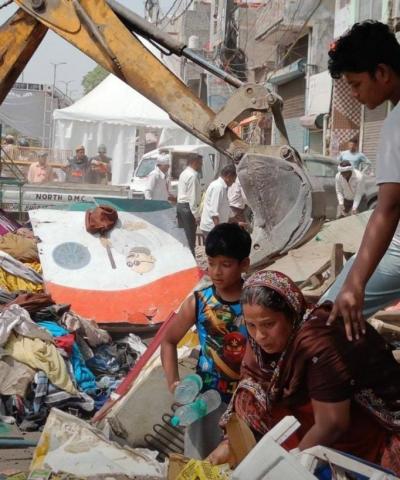
Contemporary Proof Schools
Recently one of my friends shared a picture with me where a child was picking the rags after his home was demolished by a bulldozer in the national capital. The friend asked me… How do different school curriculums make sense to this child? I see merit in this question. I will try to contemplate this issue in this article. However, the question remains the same for all my readers who read this post.
Unfortunately, our school curriculums are not designed to respond to what children experience in their daily lives. And this is not about the specific curriculum my friend mentioned, this is about the whole school curriculum. Our curriculum is designed to be “contemporary proof”. I mean what happens around- don’t talk about it in the school classroom!
The question …Is there a space where we can make our curriculum respond to the lived experiences of our children?
Yes, there is! But we need a different set of teachers. Teachers who have their agency. In our country, we don't prepare teachers to exercise agency. The whole purpose appears to be to prepare a cadre who can easily be controlled. The idea of agency in teachers is antipathy to control.
To understand the issue deeper, we also have to look into the tradition, and how teachers and curriculums in the past have responded to such situations. India is going through; I will say another wave of communal hatred. At least, In the last hundred years, India has witnessed several such waves. Millions of Indians have lost their lives. People fail to understand that the belief in the supremacy of the religion they follow, is the root cause which helps the fundamental leaders to air the fire of communal hatred across the nation. Several generations of Indians have paid a huge price for it. The problem is that we don't learn from history. On the contrary, the conviction is to repeat history. No one wins except the handful of political leaders who have tasted power and want to maintain it at the cost of the lives of common people.
Nuances around the idea of Minority.
In the global world, one cannot guarantee to be in a position of Majority throughout their life. What if one becomes a part of the minority? Would one still support the violence against the minority? The human being is a rational being is true just for the idioms, in reality, Human beings are fallible and politicians who know how to use it rule over the people. Though there are several categories of minorities, religious minorities face greater challenges across the globe.
Is there a problem with the religion people follow?
Why are people so deeply attached to religion? I think the answer lies in the failure of democratic institutions. Modern democratic institutions make a great promise of making scientific temper a foundational principle of society where justice would be based on modern human principles. In reality, in day-to-day life, people have a different experiences. They often get disappointed when they get an opportunity to interact with democratic institutions. They find widespread corruption and nepotism in the system. In other words, for them, democratic institutions serve like alien institutions. In the most crucial moments of life, they find the people they live with, come to help them. In most cases, common people’s experiences of seeking help from democratic institutions are horrific. People have no choice but to live and die with the community they belong and often, it's a religious community. We are made to see this community bonding through the lens of fundamentalism. The need of the hour is to strengthen the sane voices. Quoting Harari " Humans have an extraordinary capacity to cooperate."
It shouldn’t be seen as an exceptional problem in India, power brokers can create a divide on any issue and we have plenty of examples. Human history has enough instances to show the supreme stupidity our leaders have demonstrated in the past. On the other hand, we also have enough examples which show the extraordinary courage our leaders have shown in the past to lead humanity to a better and dignified world. It's about a choice, we all have to make. It's a choice between savagery and evolution!
Returning to the original question- How can we break the idea of “contemporary proof” schools?
I think the answer lies in the agency of our teachers. If we don't discuss an issue that a child experiences in the world outside, we are reinforcing the artificiality of education. In this context, the whole school should work as a lab, let children observe what they experience in the world outside and the school should provide the tools of analysis and reflection so that the children can make a better understanding of the issue of their concern and the issue that concern the humanity.
- Log in to post comments
